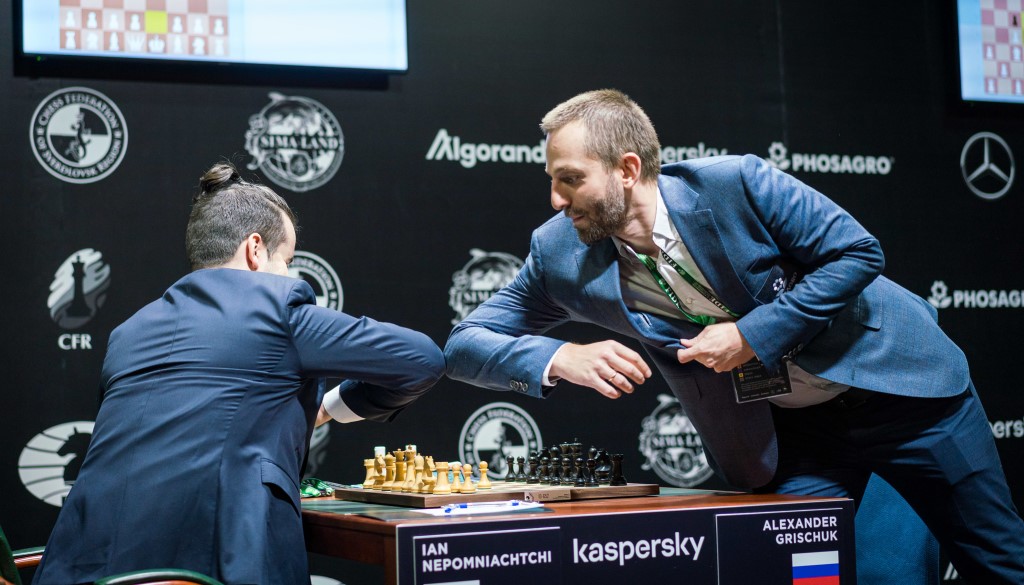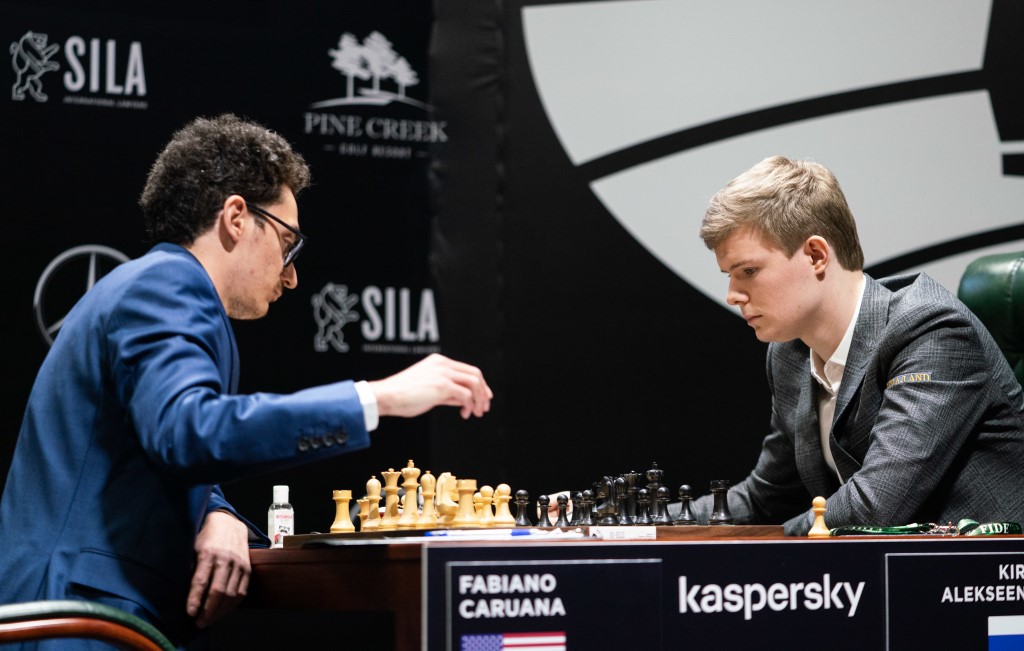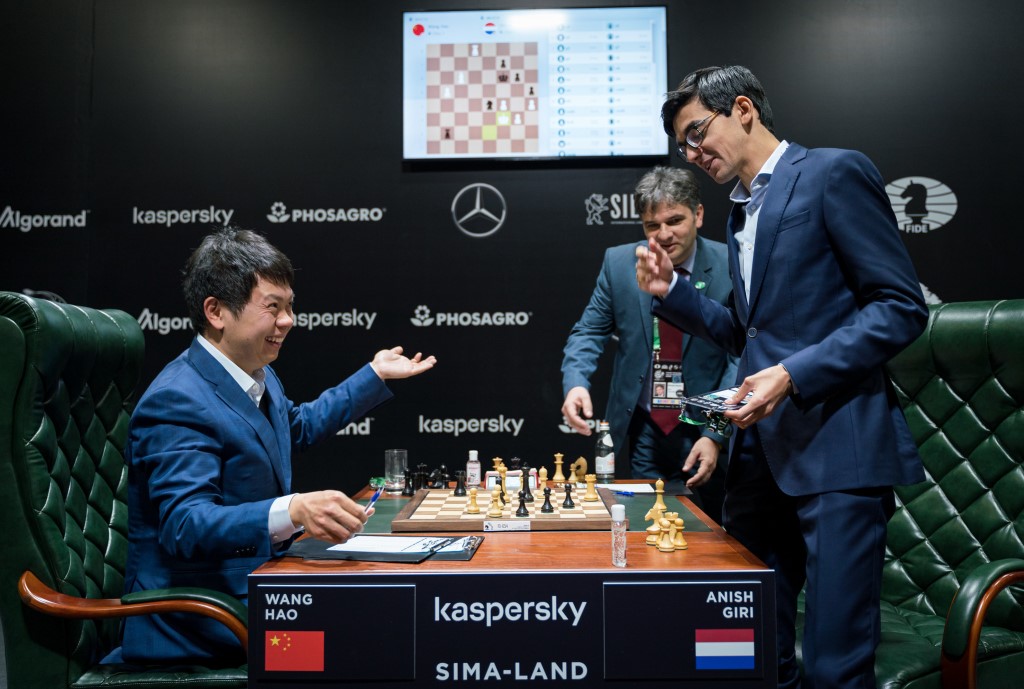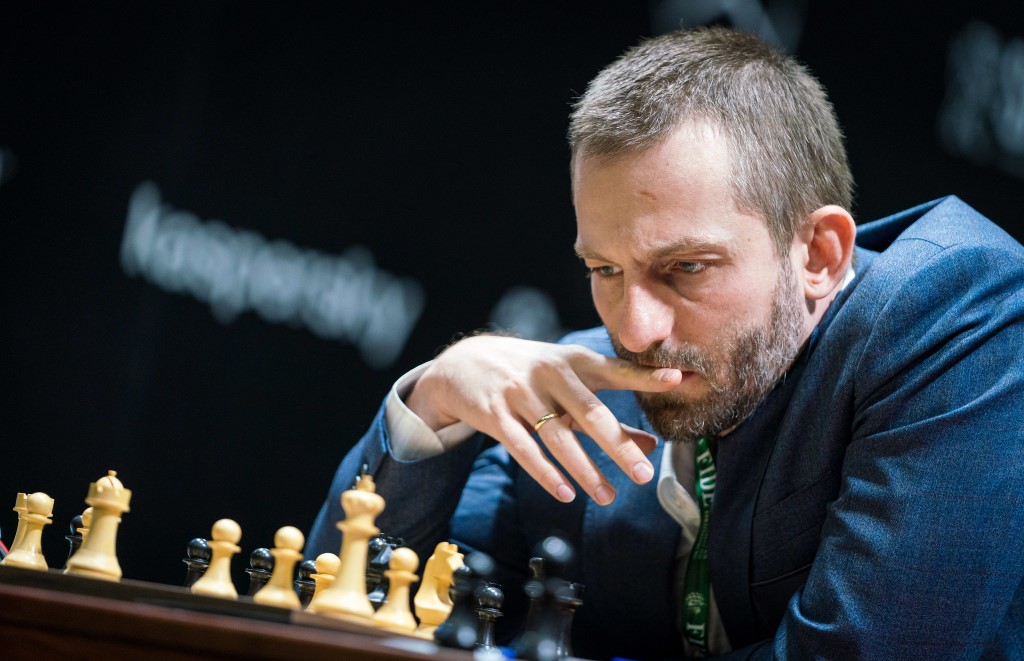


The eight-player Candidates tournament is one of the most prestigious global chess events, held every two years. The event will determine who will challenge the defender Magnus Carlsen for the title of the World Chess Champion. This year’s event has a prize fund of 500,000 Euros, which is the highest ever in the history of the Candidates tournaments.
| Name | Result | Name |
| Caruana Fabiano | 1 - 0 | Alekseenko Kirill |
| Nepomniachtchi Ian | ½ - ½ | Grischuk Alexander |
| Wang Hao | ½ - ½ | Giri Anish |
| Vachier-Lagrave Maxime | 1 - 0 | Ding Liren |
Round three takes place on Thursday, March 19 at 4:00 p.m. local time. Pairings:
| Name | Result | Name |
| Ding Liren | Caruana Fabiano | |
| Giri Anish | Vachier-Lagrave Maxime | |
| Grischuk Alexander | Wang Hao | |
| Alekseenko Kirill | Nepomniachtchi Ian |
Fighting chess continues to be the rule at the FIDE Candidates Tournament in Yekaterinburg, as two out of four games finished decisively on Wednesday, and one of the two remaining draws could have easily given Wang Hao a second consecutive victory. In the end, Anish Giri got to save a half point against the Chinese, thus avoiding a disastrous start of the event after his first-round loss against Ian Nepomniachtchi.
Wang and Nepomniachtchi had got to the second day of action as the co-leaders and both drew their games ('Nepo' split the point with Alexander Grischuk out of a Berlin Defence), which meant day-two winners Fabiano Caruana and Maxime Vachier-Lagrave joined them in the lead on 1½ out of 2.
Caruana showed good preparation against Kirill Alekseenko, entering a sharp line he usually does not use to get a convincing win. Maxime Vachier-Lagrave, in the meantime, inflicted Ding Liren's second straight loss after the world number three was overly ambitious when he pushed his f-pawn out of the opening.

Finding new ways to 'shake hands' | Photo: Lennart Ootes / FIDE
Right around the three-hour mark, the first result of the day was the draw between Nepomniachtchi and Grischuk. Not long afterwards Alekseenko resigned what had become a completely miserable position for him. Caruana's decision to play 1.d4 and enter a sharp variation of the Nimzo-Indian worked wonders, as he not only provoked his rival to err on move 15 but also got a major advantage on the clock. Alekseenko spent over half an hour looking for the best way to avoid a rook fork:
As Caruana later explained, Black's best alternative here is 15...♜b8, a manoeuvre the American had studied during his preparation. Instead, Alekseenko went for 15...♜e6, which was answered by 16.♗f4, a useful move for White in any case. Three move later, it was absolutely necessary for Black to give up a piece for three pawns, and White got the kind of advantage a sharp calculator like Caruana can convert without much hassle. A deadly kingside attack ended the game by move 34.
Daniil Dubov, who was commentating for the official site was critical of Alekseenko, explaining that "you have to remember what you don't remember" and avoid lines that will most likely get you in trouble.

The top seed (with White) against the bottom seed | Photo: Maria Emelianova / FIDE
A player who found out he would be playing about two weeks ago was facing a player who was quarantined both in China and in Moscow. Vachier-Lagrave was ready for his opponent's treatment of the opening and set up an Anti-Marshall in which he was clearly better prepared. Ding's 14...c5 was a move only seen before in a correspondence game, but his follow-up with 15...f5 was a novelty, one that left him with an inferior position.
Vachier-Lagrave was surprised by his rival's decision, but he handled the ensuing complications in exemplary fashion. After 18.c4, he thought Black had no way to equalize:
As 'MVL' later noted, a key positional feature here is the activity of the light-squared bishops — he played 19.cxb5 the next move and put his on c4, where it at least serves as a defensive piece, while Ding's counterpart on a8 is all but useless. Aware of the situation, the Chinese lashed out with 19...g5 next, but he soon found himself in a clearly lost endgame. Resignation came on move 37.
When asked about the reduced amount of time he had to prepare for such a strong event, Vachier-Lagrave replied with typical modesty:
I had motivated people helping me, and so far they all did a really good job. There's not much else to do. [...] In a way, at least I felt fresh, with the idea that I didn't spend two months studying. Now I didn't play for almost two months, [which] just feels great, especially after my schedule last year.

The late replacement is sharing the lead | Photo: Lennart Ootes / FIDE
The completely unexpected was inches away from materializing in Yekaterinburg. Had Giri not saved a draw from a clearly worse position, he would have kicked off the event with two straight losses, giving dark horse Wang Hao the sole lead on 2 out of 2.
For a second day in a row, it seemed like Giri's extremely strong preparation would end up backfiring, as he felt he had chances to fight for more with the black pieces when his opponent was ready to accept a triple repetition as early as move 12. Giri thought long and hard — more than 45 minutes — before playing 12...a6, but all he got later on was an inferior position with an isolated pawn. Wang Hao started manoeuvring until finally gaining a pawn on move 40. Eight moves later, his passer on the b-file seemed strong enough to give him a win:
But Giri demonstrated why being a resilient player in defence is one of the main features of all elite stars, finding resources at every turn until getting the half point after around six hours of play. Wang Hao looked happy with the result nonetheless, while Giri did not lose his trademark sense of humour, quipping afterwards:
Usually when I start streaks in the Candidates I don't stop, so I thought maybe I'm gonna lose fourteen games in a row.

Wang kept smiling after missing a big chance | Photo: Lennart Ootes / FIDE
The battle of Russians was the one that followed more of a typical script in elite tournaments. A Berlin Wall was put forth by Grischuk, and Nepomniachtchi never found a way to break through, although he did get a big edge on the clock. The game ended in a draw after 40 moves, but as usual Grischuk had plenty of noteworthy remarks during the post-game interview. First, he confessed:
I slept half of the game. I don't know what I was thinking. I see the clock and I have six minutes, so I wake up. [...] Then I think I was even sightly better, but of course with this time...just after waking up, it was difficult.
He accepted most people will not find this kind of theoretical struggle alluring, although things look different from his perspective:
I think it was a kind of interesting game for those who spend, you know, hundreds of hours analysing this Berlin with 10...h5, but of course for 99.999% of audience it's completely dull, boring and not interesting.
On both days of action so far, Grischuk was very critical of his colleagues' play, a rather uncommon practice among top professionals. When asked about this, he explained:
Nowadays everyone is so polite, tolerant and so on, politically correct. I mean, it used to be much more interesting and honest — you know, certain players were saying 'I will crush this guy like a bug, this one like a little baby'. It was cool. And now everyone is like 'I respect so much...' [...] Magnus says a lot of interesting things. Sometimes he says such interesting things that I wish he would not open his mouth, because he really shares some really good insights that I feel some people are not aware of.
He has a point, certainly.

Being super strong at chess does not prevent you from being an entertaining interviewee | Photo: Lennart Ootes / FIDE
GM Simon Williams recapped the action of the day
Commentary by Evgenij Miroshnichenko and Daniil Dubov